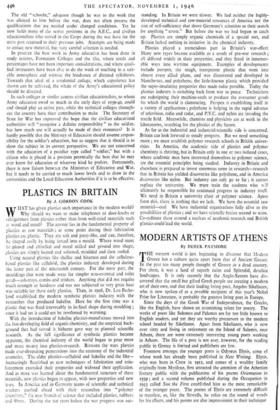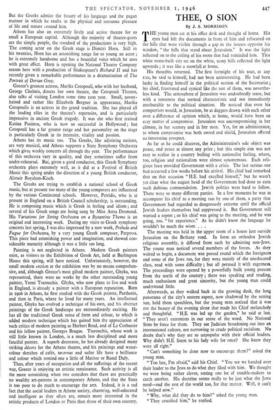MODERN ARTISTS OF ATHENS
By DEREK PATMORE
THE western world is just beginning to discover that Modem Greece has a culture quite apart from that of Ancient Greece. In the past too many people thought of Greece as a dead country. For them, it was a land of superb ruins and Splendid, desolate landscapes. It is only recently that the Anglo-Saxons have dis- covered that the small but gifted Greek people are creating a modern art of their own, and that their leading living poet, Angelos Sikelianos, who is now spoken of as a possible recipient of this year's Nobel Prize for Literature, is probably the greatest living poet in Europe.
Since the days of the Greek War of Independence, the Greeks, like the English, have shown an astonishing talent for poetry. The works of poets like Solomos and Palamas are far too little known to English readers, and yet they are worthy precursors to the modern school headed by Sikelianos. Apart from Sikelianos, who is now over sixty and living in retirement on the Island of Salamis, near Athens, there are some extremely interesting young poets working in Athens. The life of a poet is not easy, however, for the reading public in Greece is limited and publishers are few.
Foremost amongst the younger poets is Odyseus Elytis, some of whose work has already been published in New Writing. Elytis, who was born in Crete in 1912, and comes of a wealthy family originally from Mytilene, first attracted the attention of the Athenian literary public with the publication of his poems Orientation in 1939 ; and a second volume published during the Occupation in 1943 called Sun the First established him as the most remarkable of the younger poets. The poems of Elytis are extremely difficult to translate, as, like the Sitwells, he relies on the sound of words for his effects, and his poems are also impressionist in their technique But the Greeks admire the beauty of his language and the pagan manner in which he exults in the physical and sensuous pleasure of life and nature :.round him.
Athens has also an extremely lively and active theatre for so small a European capital. Although the majority of theatre-goers are the simple people, the standard of the productions is very high. The coming actor on the Greek stage is Dimitri Horn. Still in his twenties, Horn ha•s an astonishing range for so young an actor ; he is extremely handsome and has a beautiful voice which he uses with great effect. Horn is opening the National Theatre Company season here with a production of Shakespeare's Richard II and has recently given a remarkable performance in a dramatisation of The Portrait of Dorian Grey.
Greece's greatest actress, Marika Cotopouli, who with her husband, George Chelmis, directs her own theatre, the Cotopouli Theatre, also talks of visiting London some time next year. Small, tawny- haired and rather like Elizabeth Bergner in appearance, Marika Cotopoulis is an actress in the grand tradition. She has played all the leading roles in the theatre's repertoire, and is particularly impressive in ancient Greek tragedy. It was she who first trained Katina Paxinou, who is now so successful in Hollywood ; but Cotopouli has a far greater range and her personality on the stage is particularly Greek in its intensity, vitality and passion.
Athens has its music too. The Greeks, like adjoining nations, are very musical, and Athens supports a State Symphony Orchestra which gives weekly concerts all through the year. The performances of this orchestra vary in quality, and they sometimes suffer from under-rehearsal. But, given a good conductor, this Greek Symphony orchestra plays extremely well, as it did at a Festival of British Music this spring under the direction of a young British conductor, Alistair Royalton-Kisch.
The Greeks are trying to establish a national school of Greek music, but at present too many of the young composers are influenced by the various Continental schools. However, Petridis, who is at present in England on a British Council scholarship, is outstanding. He is composing music which is Greek in feeling and idiom ; and several of his Greek songs are being sung by Miss Astra Desmond. His Variations for String Orchestra on a Byzantine Theme is an original and interesting work. During my visits to Greek symphony concerts last spring, I was also impressed by a new work, Prelude and Fugue for Orchestra, by a very young Greek composer, Perpessa. This piece had astonishing power and imagination, and showed con- siderable maturity although it was a little too long.
Painting is not neglected in Athens. Modern Greek painters exist, as visitors to the Exhibition of Greek Art, held at Burlington House this spring, will have noticed. Unfortunately, however, the small modern section at the exhibition was by no means comprehen- sive, and, although Greece's most gifted modern painter, Ghyka, was represented, there were no works by the other outstanding young painter, Yanni Tsarouchis. Ghyka, who now plans to live and work in England, is already a painter with a European reputation. Born in 1906 in Athens, he first studied with the Greek painter, Parthenis, and then in Paris, where he lived for many years. An intellectual painter, Ghyka has evolved a technique of his own, and his abstract paintings of the Greek landscape are extraordinarily exciting. He has all the traditional Greek sense of form and colour, to which is added modern technique which has gained him the appreciation of such critics of modern painting as Herbert Read, and of Le Corbusier and his fellow painter, Georges Braque. Tsarouchis, whose work is still little known in London, is a much less disciplined and more fanciful painter. A superb decorator, he has already designed many striking decors for the Athens theatre, and his paintings and water- colour sketches of cafés, taverns and sailor life have a brilliance and colour which remind one a little of Matisse or Raoul Dufy.
Thus, after years of occupation and all the sufferings of the recent war, Greece is enjoying an artistic renaissance. Such activity is all the more astonishing when one considers that there are practically no wealthy art-patrons in contemporary Athens, and that the State is too poor to do much to encourage the arts. Indeed, it is a sad fact that the social leaders in Athens society, charming, well-educated and intelligent as they often are, remain more interested in the artistic products of London or Paris than those of their own country.



































 Previous page
Previous page